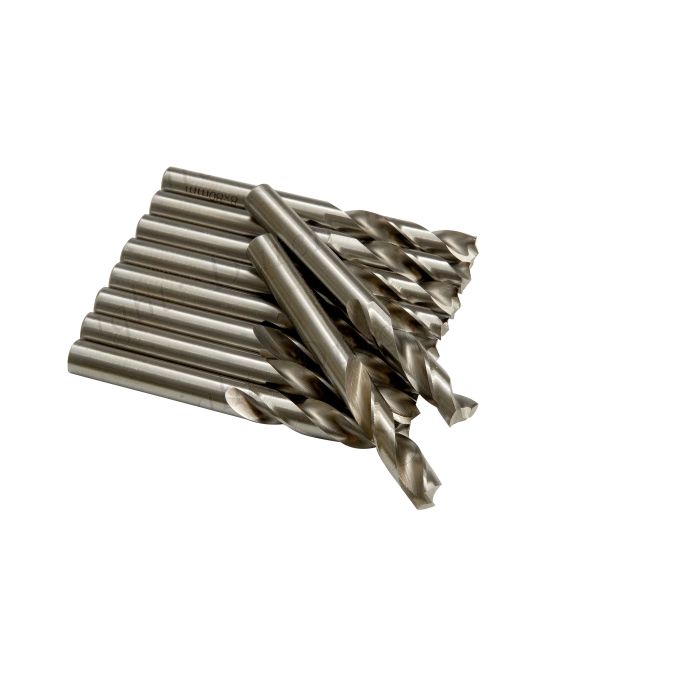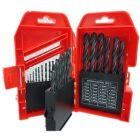| Why use a Cobalt 8mm Spot Weld Drill Bits |
| |
| A Cobalt 8mm Spot Weld Drill Bit is used mainly for removing spot welds in automotive bodywork (especially in collision repair, restoration, or panel replacement). Here's why you would specifically use a cobalt 8mm spot weld drill bit: |
| |
| 1. Cobalt Construction (Stronger and Heat-Resistant): |
| Cobalt drill bits (typically made with 5–8% cobalt blended into high-speed steel) are extremely hard and heat-resistant, making them ideal for cutting through tough materials like high-strength steel and automotive-grade panels without dulling quickly. |
| |
| 2. 8mm Size (Perfect for Standard Spot Welds): |
| Most automotive spot welds are roughly 6–8mm in diameter. An 8mm bit cuts just the right size to remove the weld cleanly without damaging the underlying panel too much — crucial when you’re trying to separate welded sheets without making extra work. |
| |
| 3. Precision and Control: |
| Cobalt bits hold a sharper edge longer, giving better precision, meaning less wandering, cleaner holes, and more control over how much material is removed. |
| |
| 4. Durability for Heavy Use: |
| Especially in professional autobody shops, a cobalt 8mm spot weld bit can survive repetitive use on multiple welds (even hundreds), unlike standard HSS (high-speed steel) bits, which can dull or burn out much faster. |
| |
| 5. Saves Time and Reduces Repair Costs: |
| A sharp, durable drill bit speeds up spot weld removal, lowers the risk of damaging parts you want to save, and avoids needing expensive panel repairs later. |
| |
| |
| |
| The benefits of using a Cobalt 8mm Spot Weld Drill Bits |
| |
| Benefits of a Cobalt 8mm Spot Weld Drill Bit |
| |
| 1. Superior Hardness and Heat Resistance |
| Cobalt drill bits are made for high-stress cutting. They can handle the intense heat and friction generated when drilling through tough materials like high-strength steel or boron steel panels without losing their sharpness or hardness. |
| |
| 2. Increased Durability and Longer Tool Life |
| Compared to standard high-speed steel (HSS) bits, cobalt bits last much longer. They resist wear, chipping, and blunting, even during heavy-duty automotive repairs, which means fewer replacements and lower tool costs over time. |
| |
| 3. Cleaner Spot Weld Removal |
| The 8mm size is ideal for the standard size of automotive spot welds. It removes welds precisely without excessively damaging the underlying panels, which is critical in professional autobody repairs and restorations. |
| |
| 4. Faster Work with Less Effort |
| Because cobalt stays sharp longer and cuts more efficiently, you can remove spot welds faster with less pressure. This speeds up the repair process, improving shop productivity and reducing technician fatigue. |
| |
| 5. Better Performance on Modern Automotive Materials |
| Today’s vehicles often use high-strength, advanced steels to save weight while maintaining safety. Cobalt drill bits are specifically suited for penetrating these harder materials that would destroy conventional bits. |
| |
| 6. Lower Risk of Panel Warping or Damage |
| A sharp cobalt bit cuts cleanly without generating excessive heat or distortion in the panel, protecting the surrounding material and reducing the amount of post-repair work needed (like grinding or patching). |
| |
| 7. Consistent Professional Results |
| Whether you’re a body shop technician or a serious DIY restorer, using the right cobalt spot weld bit delivers more consistent, higher-quality work, which enhances customer satisfaction and professional reputation. |
| |
| |
| Uses and applications of a Cobalt 8mm Spot Weld Drill Bits |
| |
| Uses and Applications of a Cobalt 8mm Spot Weld Drill Bit |
| |
| 1. Automotive Collision Repair |
| |
| Primary Use: Removing spot welds during panel replacement or structural repairs. |
| |
| Typical Applications: Quarter panels, door skins, roof panels, frame rails, rocker panels, and trunk floors. |
| |
| Why Cobalt? Penetrates tough, high-strength steels found in modern vehicle bodies without rapid dulling. |
| |
| 2. Automotive Restoration |
| |
| Primary Use: Disassembling classic car bodies by separating spot-welded sheet metal for rust repair or panel replacement. |
| |
| Why Cobalt? Ensures clean separation with minimal risk of damaging valuable or rare sheet metal. |
| |
| 3. Manufacturing and Assembly Line Repairs |
| |
| Primary Use: Spot weld removal and correction on manufacturing defects in automotive production or metal fabrication industries. |
| |
| Why Cobalt? Handles the repeated stress and harder alloys often used in industrial manufacturing. |
| |
| 4. Fabrication and Custom Metalwork |
| |
| Primary Use: Disassembling prototype frames, test panels, or custom bodywork that have been spot-welded together. |
| |
| Why Cobalt? Clean, precise cuts help preserve expensive custom materials and ensure structural integrity. |
| |
| 5. Heavy Equipment and Agricultural Machinery Repair |
| |
| Primary Use: Removing spot welds on machinery components like panels, guards, or enclosures for service access or component replacement. |
| |
| Why Cobalt? Superior hardness helps when working with thicker gauge or hardened metals common in heavy equipment. |
| |
| 6. Aviation Sheet Metal Work (Selective Use) |
| |
| Primary Use: Occasionally used for aircraft skin repairs where spot welds need to be removed carefully. |
| |
| Why Cobalt? Precision and temperature resistance are crucial for delicate, safety-critical repairs. |
| |
| 7. DIY and Enthusiast Auto Projects |
| |
| Primary Use: For car enthusiasts tackling body repairs, rust restoration, or custom builds at home. |
| |
| Why Cobalt? Professional-quality results accessible to serious DIYers who need reliable tools. |




